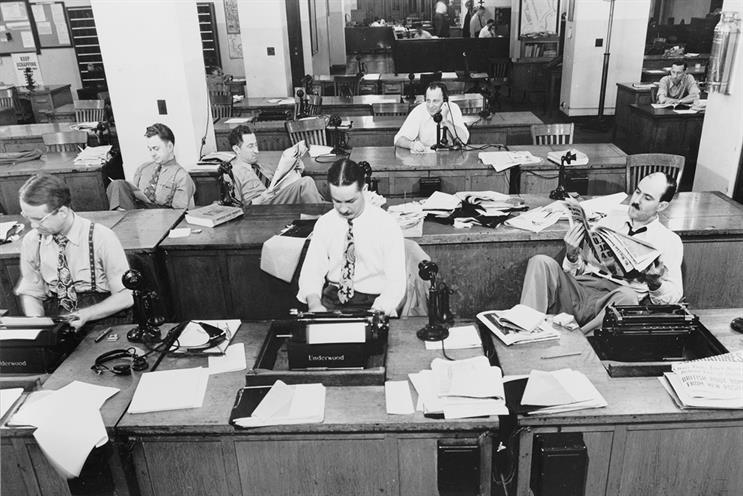When respected journalists retired or lost their jobs, they used to be "banged out" of the newsroom. Printers, editors and reporters whacked hammers or metal rulers against whatever was to hand to mark a colleague’s passing from this hackly life.
On days of mass redundancies, a newsroom could sound like the director’s cut of Stomp.
I’m not sure what the digital equivalent of banging out would be. Perhaps all those poor souls who have faced the axe at BuzzFeed or The Huffington Post have been given a mass "unfollow" or some thumbs-down emoji will be AirPlayed from the editor’s tablet on to a video wall.
Either way, the shift to a purely digital way of working doesn’t seem to be insulating journalists from the persistent, years-long drumbeat of cuts in their trade. Media owners’ business models seem unable to serve up journalism with anything but fewer journalists.
But wait: there is one place where demand for hacks is actually rising, an Elysium of not being treated like something smelly on the sole of an accountant’s shoe.
Outside the media, company marketing departments have been hiring journalists as they shift a greater share of spend into content.
These jobs are typically not in the comms team or PR – where journalists fleeing newspapers would traditionally go.
No, these jobs are not dissimilar to being feature writers and editors for newspapers and magazines.
And they have the job titles to match. Have a look on LinkedIn for "editorial director", "head of editorial", "managing editor" and the amusingly ambiguous "head of content" (I would really fancy being head of discontent).
Cazenove, the asset management company, has a head of content from the Telegraph. Insurance broker Aon and HSBC have managing editors from CNBC and the Financial Times. Fidelity International’s editor-in-chief came from Thomson Reuters via the FT and ITN.
The lawyers at Freshfields Bruckhaus Deringer have a guy from The Independent. Hogan Lovells, another law firm, has a managing editor from the BBC.
It’s not all high finance and corporate law. LinkedIn shows that Sotheby’s has an editorial director from Wallpaper*; Harvey Nichols has a managing editor who worked at People; and the managing editor at Eve Sleep, which sells mattresses, came from Hearst and Northern & Shell.
Advertisers need 'proper journalism' skills
The growing need for advertisers and marketers to access reams of proper journalism was what drew me in 2011 to move from group foreign editor of the Telegraph to a commercial editorial role.
And the reason I later started a content marketing agency was because we wanted to help companies do the journalism themselves.
This is not investigative news, but make no mistake: it is journalism.
In marketing jargon, it is mid-funnel stuff. Companies are enabled by the digital age to reach their audiences all day long. But too much overt marketing material and no-one would read and share it.
Instead, companies are in effect publishing trade magazines online, curating an intelligent and entertaining conversation in order to lodge their name in the customer’s intention-to-buy or future-tender list.
When we started our agency five years ago, we found ourselves pitching our storytelling and newsroom skills almost exclusively to marketing professionals.
They nodded sagely at the trope that everyone needs to "think like a publisher", to which we would arrogantly say that they could think all they liked, but only journalists and editors could make them "do like a publisher". It was as clear and as badly phrased as that.
Now, companies have started hiring people like me to join their in-house marketing teams. And those journalists started calling us to help them out.
Branded content, as companies are increasingly understanding, is a multidisciplinary skill – and the editing and writing part should be left to people who have spent decades getting good at it.
This shouldn’t be a revelation. A century ago, Michelin starting sending mystery diners into restaurants to create content for their touring guides. This wasn’t a job for mechanics, and the restaurant reviews didn’t mention tyres, except I would imagine in some particularly brutal assessments.
Today, the corporate need for content is growing very fast, and while I’m sorry this isn’t going to save traditional journalists in traditional media, it is opening up opportunities for great feature writers and editors.
And when they retire, they’ll get banged out of the bank with a metal derivative.
Adrian Michaels spent 21 years at the Financial Times and the Telegraph, and founded content marketing agency FirstWord Media in 2014


